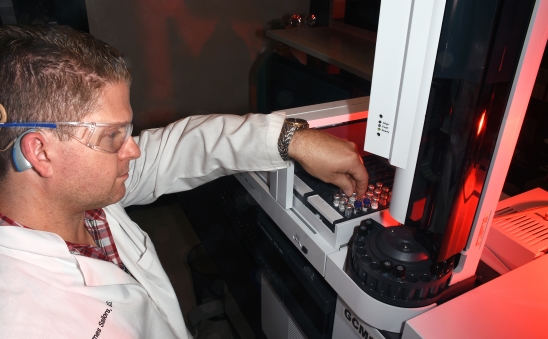The Harris County Institute of Forensic Sciences Forensic Toxicology Laboratory is accredited by the ANSI National Accreditation Board, which covers compliance with the American Board of Forensic Toxicology standards.
The laboratory provides analytical services in medicolegal death investigations (postmortem analysis), driving while intoxicated (DWI) by alcohol and/or drugs, and drug-facilitated sexual assault investigations to support medical examiners, law enforcement agencies, the justice system, and other customers within Harris County.
The Institute’s Forensic Toxicology Laboratory is equipped with advanced instrumentation to perform testing services, and its toxicologists apply this wide variety of instrumental techniques in the course of their casework.
Instrumentation and testing services include:
- Headspace Gas Chromatography – Flame Ionization Detection (Headspace GC/FID) – Detects ethanol and other volatile substances
- Enzyme-Linked Immunosorbent Assay (ELISA) – Screens for common classes of drugs
- Gas Chromatography – Mass Spectrometry (GC/MS), Gas Chromatography Tandem Mass Spectrometry (GC/MS/MS) and Liquid Chromatography Tandem Mass Spectrometry (LC/MS/MS) – Confirms and quantifies drugs and their metabolites
The testing performed in a particular case will depend on the case type, customer request, and/or laboratory protocol. The current scope and sensitivity of screening tests may be found
here.
Instructions for Collecting and Submitting Specimens for Toxicological Analysis
Specimen Collection
For full toxicological analysis, it is recommended that the submitting agency provide the following:
Driving While Intoxicated Cases
- Blood is the preferred sample for DWI cases. Please submit two full vials of blood. Blood should be collected in 10 mL glass gray-topped vials containing 100 mg sodium fluoride and 20 mg potassium oxalate.
- Urine is not recommended for DWI cases. Drug-positive urine results only indicate exposure to drugs and cannot be related to drug impairment.
Drug-Facilitated Sexual Assault Cases
- Blood AND urine should be submitted for drug-facilitated sexual assault cases. Please submit two full vials of blood and at least 50 mL of urine. Blood should be collected in 10 mL glass gray-topped vials containing 100 mg sodium fluoride and 20 mg potassium oxalate. Urine may be collected in a specimen bottle or cup.
Failure to submit the recommended volume of blood or urine may result in incomplete testing.
Each specimen vial, bottle, or cup should be labeled with the following:
- Name of the individual from whom the specimen was collected
- Date and time of collection

Specimen vials, bottles, or cups should be stored inside a leak-proof container, such as a plastic bag. The samples then may be placed inside a paper specimen container, such as a cardboard box or envelope, if desired. It is acceptable to include multiple specimen vials, bottles, or cups in one specimen container if they all pertain to the same case. The specimen container should be sealed with evidence tape and must be labeled with the following:
- Initials of the individual submitting the specimen container – initials must be written across both the tape and the container
- Name of the submitting law enforcement agency
- Case number
To maintain the integrity of the specimen, a chain of custody should be initiated upon collection and the specimen should be refrigerated as soon as possible.
Submission
- Submit specimens to the Harris County Institute of Forensic Sciences Evidence Reception located at 1861 Old Spanish Trail, Houston, Texas (Click here for detailed Evidence Submission & Testing instructions).
- A completed submission form must accompany the submission. Do not attach the form to the specimen container.
- Click here to download the submission form, or request a form from the Institute’s Evidence Receiving staff during regular business hours.
DWI Testing Protocol
In suspected DWI cases, blood specimens first undergo alcohol testing. If the blood alcohol concentration (BAC) is greater than or equal to 0.100 g/100 mL, no further testing is performed. If the BAC is less than 0.100 g/100 mL, drug testing is performed. Suspected DWI cases involving a fatality will be tested for drugs, regardless of the BAC.
Extrapolation Testimony
Forensic toxicologists are frequently asked to provide extrapolation testimony in driving while intoxicated/driving under the influence (DWI/DUI) and drug-facilitated sexual assault cases. Retrograde extrapolation uses the measured blood alcohol concentration (BAC) to estimate the BAC at an earlier time point, typically the time of driving. Anterograde extrapolation is used to estimate either the number of standard drinks necessary to achieve a particular BAC or the reverse, estimate the BAC after a specified number of drinks.
Attorneys seeking extrapolation testimony can complete the  Alcohol Calculation Request form or contact the expert reviewer listed on the Toxicology Report. Specific conditions are required to perform retrograde and anterograde calculations; therefore, calculations may not be possible if necessary information is missing and/or incomplete or if case circumstances are not conducive to extrapolation. Once completed, the written extrapolation opinion will state the basis for the opinion, including any assumptions made, and will be technically reviewed by another expert toxicologist prior to release. Please allow at least one week for the Toxicology Opinion to be emailed to the requestor.
Alcohol Calculation Request form or contact the expert reviewer listed on the Toxicology Report. Specific conditions are required to perform retrograde and anterograde calculations; therefore, calculations may not be possible if necessary information is missing and/or incomplete or if case circumstances are not conducive to extrapolation. Once completed, the written extrapolation opinion will state the basis for the opinion, including any assumptions made, and will be technically reviewed by another expert toxicologist prior to release. Please allow at least one week for the Toxicology Opinion to be emailed to the requestor.